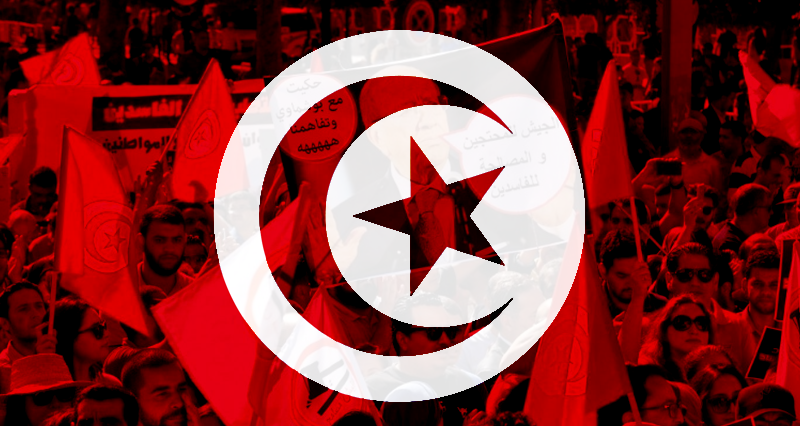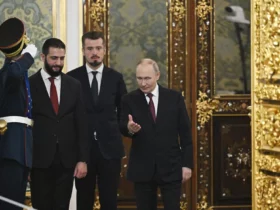After having dismissing the Prime Minister, freezed the work of the parliament for 30 days and lifting the immunity of all members of Parliament on Sunday, Tunisian President Kais Saied continued to strengthen his position.
The president announced a curfew from 7PM to 6 AM that is set for a month, banned travel between different Tunisian cities and prohibited the gathering of more than 3 people on the streets.
A presidential order also suspended all work in public administrations and institutions for two days.
Kais Saeid also ordered the resignation of the Defense and Justice Ministers., following the dismissal of the Prime Minister, the Interior Minister and the Civil Service Minister.
Dismissed Tunisian Prime Minister Hichem Mechichi said on Monday he cannot be a disruptive element, and he will hand the responsibility to whomever the president chooses, in a step that may ease the North African country’s tough political crisis, reported Reuters.
President Saied met on Monday with leaders of different national organizations, among them the National Trade Unions (UGTT) and National Union of Tunisian Women, and expressed his concern to respect the rights and freedoms and the deadlines for implementation of exceptional measures and announce the formation of a new government in the coming days, reports the national Tunisian new agency.
In response, the UGGT declared its support for Saeid’s exceptional measures but warned from turning thse into permanent measures.
Ennahda continues to reject “coup” and calls for “calm”
The speaker of the parliament and leader of the Ennahda movement, which presents the biggest group in the parliament, Ghannouchi stated that the Executive Office of the Movement has convened on Monday.
Ghannouchi stated that his movement the president’s exceptional measures a “coup against the constitution and institutions”, called “the head of the state to retract these and resume the work of the parliament”.
Ghannouchi also “saluted the military and security organizations” of the country, calling them “to distance themselves from political quarrels and rivalries”.
Rejecting calls for “civil strife”, the Ennahda movement finally called for a “national dialogue to get the country out of the crisis”.
A sit in organized by Ennahda on Monday in front of the parliament has not been continued on Tuesday.
International reactions
Western countries stayed neutral, calling for “calm” and continuing “the path to democracy.”
The US Secretary of State Blinken had a “good” phone call with President Saied, urging him to “maintain open dialogue with all political actors”.
The State Department’s spokesperson urged to solve the country’s problems “based on the Tunisian constitution” and expressed worries on the storming of Al Jazeera offices by the police.
The White House spokesperson Psaki rejected to answer whether a coup had taken place, stating “a coup is a legal determination, and we would look to the State Department to conduct a legal analysis before making a determination. So there hasn’t been a conclusion on that front.”
The Washington Post meanwhile reports that calls are rising from the Republican Party to condemn the coup.
Sen. Lindsey O. Graham (R-S.C.) is reported to have said that “The United States and the Western democracies need to be all in, on the ground in Tunisia, stopping this before it gets out of hand.”
French foreign ministry “has taken note” of Saeid’s measures and called “for the return, as swiftly as possible, to the normal functioning of the institutions, which must be able to focus on the response to the health, economic and social crisis”.
The German foreign ministry stated “concern” about “the last weeks and days of rising violence” and called for “a fast return to the constitutional order”. Berlin stated that “all constitutional powers need to engage constructively to seriously advance political and economic reforms”.
The spokesperson of the German foreign ministry also rejected to speak of a coup, emphasizing that the work of the parliament “just had been freezed”.
Stronger reactions came from Turkey. While the foreign ministry expressed “concern about the freeing of the parliament’s activities, which express the poeples’ will”, thhe president of the Turkish parliament, Mustafa Şentop called Saied’s measures “a coup against the constitutional order”.
The United Nations’ Secretary General and the Arab League called for “restraint and dialogue between the parties” in Tunisia. The Arab League Secretary General contacted the Tunisian foreign minister on Monday, where he expressed the League’ “full support to the Tunisian people and wishes that Tunisia quickly overcomes the current turbulent phase.”

















Leave a Reply